- Home
- Stacia Deutsch
Sacagawea's Strength Page 2
Sacagawea's Strength Read online
Page 2
I landed smack in the middle of a river. The boys were already there, standing in the knee-deep water. Water quickly filled my tennis shoes, soaking my socks and making my jeans feel heavy.
“Yuck,” Zack grimaced. “I hate wet feet.”
I hated wet feet too, but I wasn’t going to complain. Or groan. Or worry. I’d leave all that to Zack. Right after Mr. C had said we didn’t have to do the mapping project, I had snapped back to being my bold and curious self.
Besides, I was in the past, standing in some river. I knew I wasn’t anywhere near whatever was making those animal noises. That was good.
Jacob, Zack, and I moved as quickly as we could toward the riverbank. The water wasn’t deep, but it was moving fast and felt like melted ice. As I pulled myself out onto the dusty ground, I noticed that Bo was still standing in the water.
“Bo,” I called out. “Are you frozen?”
Bo didn’t respond. But I could see he was shivering. His sweatpants and T-shirt were totally soaked.
“Bo?” I repeated. “What’s the deal? Do you need help?” I was starting to worry.
“Look,” he said at last. One word. So soft, I could barely even hear him over the rushing river.
I glanced in the direction he was facing. A large wooden box was floating downstream toward him. And behind that, an empty canoe. It was upside down and moving fast.
The box would pass him by. But in less than a minute, the canoe would sweep Bo off his feet, carrying him away. “Bo!” I shouted, straining my voice. “Get out of the water!”
“I think that’s one of Lewis and Clark’s canoes!” he called back. “I have to save it.”
I quickly turned to the twins. “He’s going to get killed. That thing is coming too fast.”
Jacob stashed the computer behind a tree, and the three of us jumped into the water. Gritting my teeth against the cold, we lined up next to Bo.
The canoe was practically flying toward us.
Jacob counted: “One. Two.” And on three, the middle of the canoe hit me solidly in the thighs, nearly knocking me over. I barely kept my balance, holding on to the canoe with all my might. It dragged me a short ways.
Bo was next to me. He wrapped his hands around the left end of the canoe, trying desperately to slow it down.
Jacob was struggling with the other end. Pushing at it with straight arms.
And Zack was . . . shoot! I didn’t see Zack anywhere.
I called out, “Jacob, where’s your twin?”
Jacob glanced around, then tilted his head downstream. When we’d gone after the canoe, Zack had reached for the wooden box. He was sort of on top of it, sort of under it. Dragging the crate toward the river’s edge.
Bo, Jacob, and I managed to flip the canoe over and get it to the side. We pulled it up onto the riverbank, far enough that the river wouldn’t wash it away again. When we were done, we hurried over to Zack.
“Hey, what are you doing?” I called out as we sloshed through the water toward him.
“I’m helping the Quarter Lady,” Zack called back.
It was then I noticed the young woman standing with Zack. My sister, CeCe, is sixteen years old. I guessed that this woman was about the same age.
The woman was in the water, pulling on the box, while Zack guided it toward the river’s edge. A big hole was in the side of the crate. Loose papers were floating down the river.
By the time Zack and the young woman had gotten the crate wedged on land, Zack was breathless and shivering. Bo, Jacob, and I were also exhausted. I placed my hands on my knees, taking deep breaths.
The woman, though, wasn’t resting on the riverbank with us. She’d jumped back into the rushing water and was sweeping the loose papers into her arms. The papers were totally soaked and moving quickly with the current. It seemed ridiculous to try to save them.
But she was determined to collect as many as she could. Even though her arms were full, she bent to scoop up one more. It was then, as she leaned forward, that we noticed the baby strapped to her back.
“That’s Sacagawea!” Bo declared. “Her baby was only two months old when she and her husband joined the Corps of Discovery. They are working as translators for Lewis and Clark.”
“Zack,” Jacob asked, “if that’s Sacagawea, why do you keep calling her ‘the Quarter Lady’?”
“I didn’t know her name. But still, I recognized her,” Zack said matter-of-factly. “In our time, her face is on gold quarters.”
“I’ve seen those coins, and they’re not quarters. They’re gold dollars.” Jacob sighed. “That would make her the Dollar Lady, you spaz.”
“Same size as a quarter. Same shape as a quarter. Looks like a quarter to me,” Zack claimed. “And I’m not a spaz, you are.”
I’d have yelled at them both to cut it out, but Bo calmly told the twins, “Sacagawea and her baby are pictured on a dollar coin,” he explained. “But dollar coins have never been popular. No one ever uses them. I think dollar coins are too easily confused with quarters.”
“See?” Zack chuckled. “I was kind of right.”
“That means I was kind of right too,” Jacob said, smiling.
Sacagawea was struggling to pull papers from the rushing water. Her dress was sopping wet. It looked like it was made of animal skin. There were wet feathers in her hair.
“We can’t stand here while she does all the work.” Bo headed back toward the river. “We have to help.”
Wet and cold, we all followed Bo.
A tall, thin man appeared suddenly, blocking our way. “Stop!” the man commanded. “We have saved all that we can.” He called to Sacagawea, whistling and waving his arms to get her attention. She immediately climbed out of the water, carrying the papers she’d collected.
Sacagawea set the papers out to dry along the shore, securing them with rocks. When she finished, the man told her to go back downstream. He didn’t actually use any words to explain; rather, he pointed to her dress and to the baby, indicating that she should change them both into dry clothes.
Sacagawea didn’t speak. She simply nodded and walked away.
Soaked, tired, and freezing cold, Bo, Jacob, Zack, and I all collapsed down on the ground. We were exhausted and needed to relax in the warm sun.
Standing over us, the man said, “My own men ran away, afraid to be pulled downriver by the current. Not one of them attempted to get the canoe, the papers, or the supply box from the water. You and Sacagawea saved many important things today.” There was sincere gratitude in his voice when he said, “Thank you.”
“You’re welcome,” Zack replied. “But could you move left slightly? You’re blocking my rays.”
The man chuckled and took a step to the side. “Who are you and where are you from?” he asked. “We have not seen other people in weeks. Not even Indians.”
I wanted to tell him that, in our time, we didn’t use the word “Indians.” We use the phrase “Native Americans” because the tribes didn’t come from anywhere else. They were some of the first people in this country.
Bo gave me a look that said he knew what I was thinking and that I should let it go. In 1805 the word “Indian” was the right word. So I told the man our names instead.
Then I began to say, “We came from the fut—” when Jacob cut me off.
“TMI,” Jacob interrupted.
I knew what that meant. Too Much Information. Jacob was trying to say that I shouldn’t go around telling people about the time-travel machine. We’d just tell Sacagawea. And then, only if it would help us to convince her to . . . to not quit whatever she was quitting.
Bo tipped a finger toward the man and mouthed, “Captain Clark.”
“That’s Captain Clark?” Zack asked softly, and Bo confirmed it with a strong nod.
William Clark was wearing an old-fashioned United States Army jacket like I’d seen in movies. There were medals and stripes across the front and down the sleeves.
“So, you were about to tell me where you c
ame from,” Captain Clark said, his red hair glistening in the sunlight.
“We’re from over there.” Jacob pointed over his shoulder with his thumb. Behind us, towering in the distance, were huge mountains. There was snow covering the peaks.
“Yeah,” I confirmed. “We came from that way.” Then I leaned over and whispered to Jacob, “Where are we exactly?”
Jacob looked at the computer screen and read, “ ‘Montana. August 17th, 1805.’ ”
“I knew that was the Bitterroot Range,” Bo said. “It is the northernmost part of the great Rocky Mountains.” Bo’s face shone with excitement as he added, “I’ve been to Montana before.”
At Bo’s words, Captain Clark squinted his eyes to get a better look at us. “Are you certain you are from this part of the West?”
I sat up and shrugged. I was feeling too wet and wiped out to make up a whole, big story, so I said simply, “We’ve come to meet Sacagawea.”
“Ahh,” Captain Clark said. “So her fame has reached these lands. Janey is an important member of this expedition. We couldn’t have come this far without her.”
“Who’s Janey?” I whispered to Bo. But before Bo could answer, Captain Clark said, “Here come Janey and Pomp now.”
I figured that Janey must be the nickname William Clark had for Sacagawea since she was the only one headed toward us.
Bo leaned over and told me that Sacagawea’s baby’s real name was Jean-Baptiste, but William Clark called him Pomp. Sacagawea and Pomp were both wearing dry clothes. She was moving very slowly, carrying a large pile in her arms.
While we waited for her to arrive, William Clark asked, “Have you seen Captain Meriwether Lewis?” There was a troubled look in his eyes. “Captain Lewis said he would set up camp near here, but we haven’t found him yet. It is my fault that we are late. By now, he must be worried.”
“We haven’t seen him,” I responded. “Why are you so late?”
Captain Clark replied, “A few days ago, Lewis and I discovered that a boat cannot sail the whole way to the Pacific Ocean. The river is too shallow. Captain Lewis left me with our canoes and most of the Corps of Discovery. He took a few men with him. They went to find the Shoshone tribe. We must buy some horses from them. We are going to have to ride through those mountains to continue our journey westward.”
He pointed at the landscape and sighed. “The Rocky Mountains are not at all what we expected. When we began our expedition, we looked at an old map a trapper had drawn of this area. The map showed just one, small, easy-to-climb hill.”
I laughed thinking about how really bad the old maps were: Woolly mammoths, erupting volcanoes, and one little hill. I looked at the huge range of mountains before us. The peaks reached up to the sky, and the hills went on and on as far as my eyes could see.
President Jefferson really needed Lewis and Clark’s new map. “Good thing you’re here,” I told William Clark.
“Yes. We will definitely add these mountains to our new map.”
“New map?” I repeated, and suddenly I realized what we were doing. I turned to Bo and asked, “Meeting Sacagawea is all about mapmaking isn’t it?” I felt a little like Mr. C had tricked me. I had hoped when we left the field trip we were done with cartography, but the fact was, meeting Sacagawea was also going to be about making maps.
Bo asked, “Would you have come if I had told you this adventure was about making maps?”
“I don’t know—” I stopped and thought about it. “Of course I would have come. Even if they are boring, maps are part of American history,” I admitted. “And it’s our job to save history.”
Zack laughed and said, “Well, at least we aren’t the ones who have to draw it.”
Captain Clark clearly had no clue what we were talking about. He shook his head and went on. “I shall also record in my journal that the river through this area is very shallow. I thought it looked deep enough to try to float a canoe and some of our supplies.”
Captain Clark looked down and bit his lip sadly. “I was wrong. The canoe hit a rock and overturned. If you children had not caught the boat—” He sighed deeply and started a different thought. “Well, it is a good thing Captain Lewis is out looking for horses. Obviously, we cannot travel in the water anymore, at all.”
Just as I began to say that I was glad we didn’t have to go through the mountains with them, Sacagawea arrived. “These are for you and your friends,” she said, handing me the pile she was carrying. “Take these dry clothes and change.”
I said, “Thank you,” but she didn’t seem to understand me, so instead I smiled really big and accepted the clothing.
The boys were staring, totally confused, at the pile in my arms. They must not have been paying attention. I explained that Sacagawea had brought us dry clothes.
After passing out the items, we all scattered into the bushes to get dressed. When we returned, we were each wearing adult-size army uniforms and beaded, leather moccasins. We were carrying our wet things.
Down by the river, Sacagawea was going nuts. She was singing and dancing and waving her hands in the air.
“What is going on?” Zack asked. “We weren’t gone even one whole minute!”
We noticed that the men from the Corps of Discovery had caught up. They were carrying heavy loads of equipment, canoes, and boxes of supplies. But that wasn’t why Sacagawea was excited.
In the opposite direction from the Corps, several Native-American men rode toward us on horseback. Each man had a bow in his hand and a basket of arrows slung over his back.
Rushing toward the Native Americans, Sacagawea was shouting with joy, “At last. At last. My people. We have found my people!”
Camp Fortunate
“What is Sacagawea doing?” Zack asked as we all followed the Native Americans and their horses. They knew where Meriwether Lewis had set up camp. “She keeps on yelling, dancing, and running in circles. Boy, she’s acting strange.”
“What’s wrong with you, Zack!?” I wondered if he should have his hearing checked. “Aren’t you listening? Sacagawea says she found her people. She’s happy.”
It was no wonder why Jacob fought so much with Zack. I felt like arguing with him too. Frustrated, I turned to Bo and asked, “You heard her, right?”
“Abigail, you can’t possibly know what she’s saying because she’s speaking in Shoshone.” Bo looked at me like I was loopy.
“What are you talking about? She’s speaking English. I understand every single word—” Even as I said it, I knew how I had understood. I stopped walking. “Sorry, guys,” I apologized.
In my hand was the envelope Mr. C had given me before I time-traveled. It was wet and soggy. I had taken it out of my jeans pocket when I changed clothes. I held the envelope up into the sunlight.
“What’s that?” Jacob asked.
“Mr. C gave me this envelope,” I explained, ripping open the sealed flap. “He said this would help us figure out Sacagawea’s dream.”
Inside were five bright blue, flat stones. I dumped them into my hand. Engraved on each stone was a picture: One had an antelope. Another a mountain lion. The third one had a raccoon on it. A coyote was carved on the fourth. On the last one was a bear.
“I think these stones helped me understand Sacagawea.” I randomly dropped one stone into each boy’s hand. There were two left, so I took one and I stuck the last one in the pocket of my borrowed army jacket.
“These must be translators!” Jacob cheered. He turned it over in his hand, inspecting it. “Mr. C is a great inventor. I bet there’s a mini computer chip hidden in here somewhere.”
“Don’t take it apart to find out,” Zack warned his brother.
“All I know is that when I was holding the envelope with the stones,” I said, “I could understand Sacagawea like she was talking in plain English.”
Bo rubbed his chin and said, “But when you spoke to her, thanking her for the clothes, she clearly didn’t understand you.” He was thinking hard. “We are goi
ng to have to figure out how to talk to her.”
“We can swallow it,” Jacob suggested, rolling the blue stone between his fingers. “Maybe then we’ll be able to speak Shoshone.”
“It might get lodged in our throat. We could choke and die.” Zack held his hands over his throat and began gagging. “The stones might be made of toxic materials. We’d be poisoned and die.”
I didn’t think we’d die, but I really didn’t want to swallow the stone either.
We were trying to figure another way to talk to Sacagawea when Captain Clark interrupted. He invited us to come meet the Shoshone chief.
“There must be a way to use these so that she can understand us,” Jacob mumbled as we followed William Clark to a large, open area downstream. “It’s like a little computer,” he said, turning the stone over and over in his palm, trying to figure out how it worked.
In a grassy place, the Corps of Discovery had made a tent by tying a boat sail to a tall bush. Under the shade, a Native-American man was seated on a white robe spread on the ground. Captain Clark introduced us to him. He was Chief Cameahwait.
Captain Clark pointed out Sacagawea’s husband, a French trapper named Toussaint Charbonneau. Then we shook hands with the Corps translator, François Labiche.
Finally, William Clark introduced us to Captain Meriwether Lewis. Captain Lewis was tall and thin like Captain Clark. He had grayish hair and was very tan. I guessed that he spent most of his days outside.
A black dog lay sleeping near Captain Lewis. “The dog’s called Seaman,” Bo explained in a whisper. “He belongs to Captain Lewis. I read that he traveled the whole way to the Pacific Ocean and back again.”
“Where’s Sacagawea?” I asked Bo as we laid our clothes out to dry and joined the group under the shade.
“Here she comes,” Jacob said, pointing as Sacagawea and the baby Pomp joined us.
As Sacagawea went to sit down next to her husband, she paused, staring at Chief Cameahwait. I figured it was because she had missed the introduction and didn’t know his name, but she never asked who he was. In fact, she didn’t talk at all. She just kept staring at the Shoshone chief.

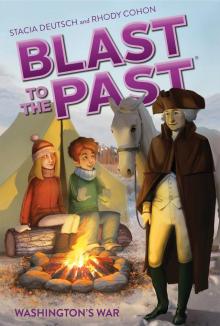 Washington’s War
Washington’s War The Friendship Code #1
The Friendship Code #1 Spirit Riding Free: PALs Forever
Spirit Riding Free: PALs Forever Ghostbusters Movie Novelization
Ghostbusters Movie Novelization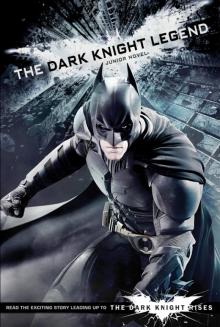 The Dark Knight Legend
The Dark Knight Legend Cinnamon Bun Besties
Cinnamon Bun Besties Spirit Riding Free: Abigail's Diary
Spirit Riding Free: Abigail's Diary Spirit Riding Free--Pru's Diary
Spirit Riding Free--Pru's Diary Diary of an Evil Queen
Diary of an Evil Queen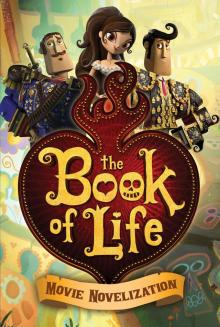 The Book of Life Movie Novelization
The Book of Life Movie Novelization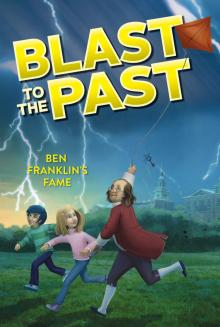 Ben Franklin’s Fame
Ben Franklin’s Fame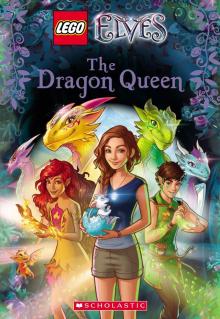 The Dragon Queen
The Dragon Queen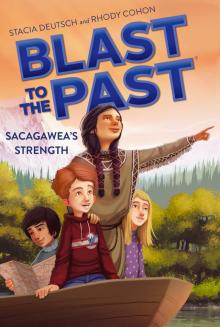 Sacagawea's Strength
Sacagawea's Strength Team BFF--Race to the Finish! #2
Team BFF--Race to the Finish! #2 Spirit Riding Free: Lucky's Diary
Spirit Riding Free: Lucky's Diary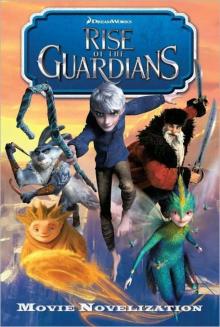 Rise of the Guardians Movie Novelization
Rise of the Guardians Movie Novelization Dragon Games
Dragon Games In the Stars
In the Stars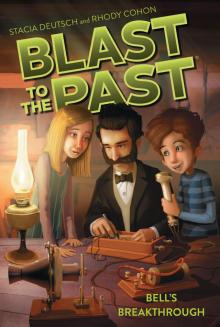 Bell’s Breakthrough
Bell’s Breakthrough